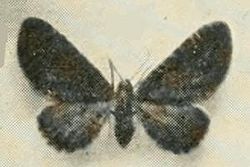| Eupithecia thalictrata | |
|---|---|
 | |
 | |
| Scientific classification | |
| Kingdom: | Animalia |
| Phylum: | Arthropoda |
| Class: | Insecta |
| Order: | Lepidoptera |
| Family: | Geometridae |
| Genus: | Eupithecia |
| Species: | E. thalictrata |
| Binomial name | |
| Eupithecia thalictrata | |
| Synonyms | |
| |
Eupithecia thalictrata is a moth in the family Geometridae. It is found from Europe (France, Switzerland, Austria, Italy, Poland, Lithuania and Estonia) [2] to the eastern Palearctic realm.

The wingspan is 18–20 mm. Adults are on wing from April to June. [3]
The larvae feed on Thalictrum species [4] (including Thalictrum foetidum and Thalictrum minus ). [5] Larvae can be found from June to July.